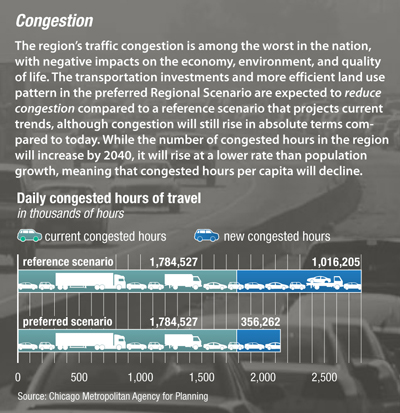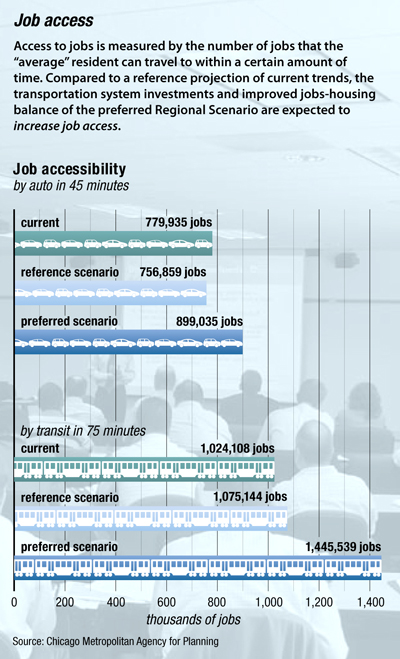Press Release, 1-21-10
Press Contact: Tom Garritano (312-386-8609 or tgarritano@cmap.illinois.gov)
Program Contact: Bob Dean (312-386-8834 or bdean@cmap.illinois.gov)
Preferred Regional Scenario establishes policy directions of the GO TO 2040 comprehensive plan for seven counties of metropolitan Chicago
As regional plan nears completion, the Chicago Metropolitan Agency for Planning previews the plan's recommendations
CHICAGO, January 21, 2010 -- By 2040, the seven-county region can have better transportation, increased economic development, cleaner air and water, more-accessible jobs and housing, and other quality-of-life improvements, say leaders of the Chicago Metropolitan Agency for Planning (CMAP). The agency today released its preferred Regional Scenario -- one last precursor to the GO TO 2040 comprehensive regional plan that will be available in draft form this spring, with implementation of the final plan to begin in October 2010.
The Regional Scenario (www.cmap.illinois.gov/2040scenario) establishes clear policy directions that CMAP will pursue in the plan itself, which is intended to guide growth and investment choices through mid-century and beyond in the counties of Cook, DuPage, Kane, Kendall, Lake, McHenry, and Will. Based on two years of research, analysis, and public input, the scenario tackles pressing issues that require coordinated solutions at the local and regional levels.
Its preliminary recommendations include:
- Creating more livable communities with compact, mixed-use development to serve as building blocks of the region's future.
- Investing more effectively in education and workforce development, while fostering a business climate that encourages job growth and innovation by the private sector.
- Improving the region's high-quality system of parks and open space, while reducing consumption of energy and water.
- Planning multi-modally for transportation and target transportation investments to achieve outcomes such as economic growth, environmental protection, or congestion reduction, while finding more sustainable ways to finance infrastructure improvements.
- Tracking the region's performance to assess where to make improvements to reach the desired future.
"It will take significant political will to implement the GO TO 2040 plan's policies and investments," said CMAP Board chairman Gerald Bennett, mayor of Palos Hills. "The preferred scenario doesn't avoid -- nor will the plan itself avoid -- the difficult choices that face our region. The current economic downturn reinforces the importance of maximizing the benefit of precious public resources, and that is exactly what the comprehensive regional plan will be about. Our agency's role is to lead with bold policies, backed up by the best available research and data."
GO TO 2040 will include a financial plan for funding capital investments to be selected on the basis of their overall regional benefits. Last week CMAP published a state and local taxation report that is among dozens of strategy research papers and snapshots generated by the regional planning process. By combining that research and analysis with extensive public input, the Regional Scenario goes beyond the broad goal statements of the Regional Vision, which was approved by the CMAP Board in 2008.

The scenario's policy directions are organized in three categories: Local Infrastructure, Regional Infrastructure, and the Policy Environment. The plan will define infrastructure to include both the "gray" kind (including transportation, energy, telecommunications, and water-treatment systems), as well as "green infrastructure" (including networks of open space and waterways). Within that framework, the plan's central purpose will be to:
- Support local actions that help to create livable communities.
- Prioritize regional infrastructure investments to achieve long-term goals.
- Foster a policy environment that results in sustainable prosperity for the region.
The specific recommendations of GO TO 2040 will focus on several priority implementation areas, including: land use and housing, energy/water conservation, food systems, open space, transit improvement, freight, transportation finance, education/workforce, economic innovation, tax policy, data sharing and transparency, and better coordination of federal, state, and local programs.

CMAP's analysis and outreach indicate that, if the preferred Regional Scenario becomes reality, it will bring substantial quality-of-life benefits, including:
- Infrastructure will be more effective to use and efficient to maintain.
- The economy will be stronger, and public costs will be contained.
- The environment will be healthier, and pressure on natural resources will be eased.
- The region as a whole will be a more equitable place to live and work.
"Each policy direction in the scenario involves tradeoffs. We are striving for the plan to be both bold and implementable," said CMAP executive director Randy Blankenhorn. "The GO TO 2040 plan will set the stage for a better, well-managed future for the region. As we ramp up to begin the implementation campaign, local governments, private and public stakeholders and organizations, and the public all have pivotal roles to play. Thanks to last year's Burnham Plan Centennial, public awareness of the need for effective planning is at an all-time high."
CMAP hosted a kickoff event at its offices today to welcome former participants in the 2009 centennial into the GO TO 2040 planning process. Combined partners of the centennial and CMAP learned about the preferred Regional Scenario and how their organizations can help in the comprehensive regional plan's promotion and implementation.
--END--
About CMAP. The Chicago Metropolitan Agency for Planning (CMAP) is the comprehensive regional planning organization for the northeastern Illinois counties of Cook, DuPage, Kane, Kendall, Lake, McHenry, and Will. By state and federal law, CMAP is responsible for producing the region's official, integrated plan for land use and transportation. The agency's innovative GO TO 2040 planning campaign will develop and implement strategies to shape the region's transportation system and development patterns, while also addressing the natural environment, economic development, housing, education, human services, and other factors shaping quality of life. See www.cmap.illinois.gov for more information.